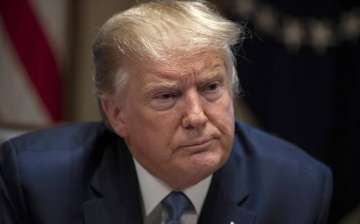Donald Trump extends coronavirus pandemic guidelines to April end
In a surprise move US President Donald Trump has extended the federal anti-coronavirus guidelines till the end of April after receiving grim projections from medical experts about the likely toll of the pandemic.

In a surprise move US President Donald Trump has extended the federal anti-coronavirus guidelines till the end of April after receiving grim projections from medical experts about the likely toll of the pandemic.
As the number of confirmed cases in the US reached 139,675 on Sunday evening, Trump announced at the White House that instead of relaxing soon the guidelines social distancing at their core, he would continue them.
As they are only guidelines, it is up to the state and local governments to enforce them under the US federal system. They were set to expire on Tuesday.
Trump said that he expected a full recovery by June 1, while cautioning that it could be earlier or sooner depending on how the pandemic is controlled.
The need for social distancing under the guidelines has resulted in the shutdown of all non-essential parts of the economy plunging the US into a recession, a price it will have to pay to save lives.
About half the US population is under semi-lockdown known as Stay-at-Home orders imposed by 27 of the 50 states.
Trump had earlier discussed relaxing the guidelines on Easter, which falls on April 12, to restart the economy, but said on Sunday that had only been "aspirational" and now only expected the deaths from COVID-19 to peak around that date.
He said, "Nothing would be worse than declaring victory before the victory is won. That would be the greatest loss of all."
Earlier, the top White House expert on COVID-19, Anthony Fauci, said on CNN that the US could see one million cases and 100,000 deaths from the disease based on models of how the infection could spread.
Discussing the models projecting the number of deaths, he said, "Looking at what we're seeing now, you know, I would say between 100 and 200,000. But I don't want to be held to that."
Before Trump's announcement of guidelines extension, Democrat Speaker Nancy Pelosi accused Trump of being in denial and underestimating the gravity of the situation.
"Don't fiddle while people die, Mr President," she said on CNN.
She said that Trump's denial of the severity of the pandemic at its start "was deadly" and "we cannot continue to allow him to continue to make these underestimates of what is actually happening here."
Trump countered these accusations by saying that he imposed restrictions on travellers from China on January 31, and on 26 European countries on March 11, which was extended to two more.
Some Democratic Party leaders like former Vice President Joe Biden had criticised the travel restrictions.
At his news conference, Trump referred to worst case scenario projections of two million deaths if no precautions had been taken and asserted that the actions taken by him had forestalled that eventuality.
Trump spoke of the cooperation with the private sector in ramping up production of essential medical equipment like ventilators and supplies like masks.
Because of the systematic deindustrialisation of the US under previous administrations, the country facing difficulties in meeting its needs in a medical emergency.
He said that the 51 aircraft would be flying in supplies from around the world to meet the needs of the hospital facing dire shortages.
The first plane landed with supplies from China.
With the extension of the guidelines, the US will need more rounds of economic relief packages, beyond the $2 trillion programme enacted last week with direct payments to people, extension of unemployment benefits, additional medical care and loans to business.
Both Trump and Pelosi agreed on this.